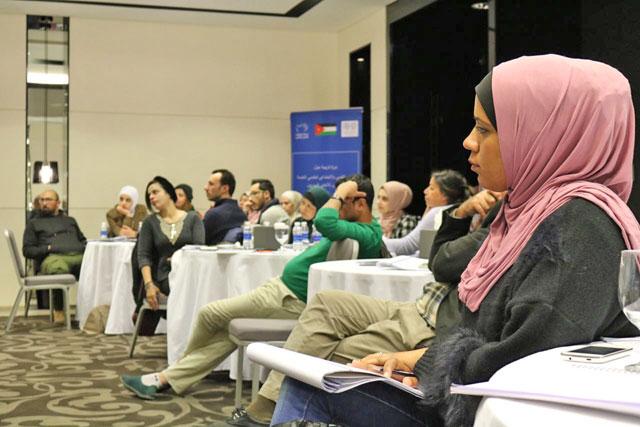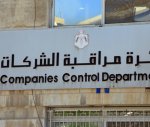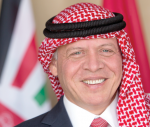You are here
Social, health workers receive psychosocial and mental health support training
By Camille Dupire - Dec 13,2017 - Last updated at Dec 13,2017

Participants at a workshop are briefed on the mental health trauma experienced by Syrian refugees and host communities after the Syrian crisis in Amman on Wednesday (Photo by Fedza Lukovac)
AMMAN — A training programme aimed at improving the skills of social and health professionals working with Syrians and Jordanians conducted its last session this week, 9 months after its inception in April 2017.
Implemented by IOM, the UN migration agency, in cooperation with the Ministry of Social Development, the training sought to help enhance the psychological support provided to Syrian refugees and their host communities in Jordan, according to its organisers.
“To include the mental health component in their work, front-line officers need to be trained on basic techniques such as deescalation of a violent situation, the principle of ‘do no harm’, survivor centred approaches when dealing with Gender Based Violence survivors and children who have survived violence,” said Marie Adèle Salem, the session’s trainer.
The last of four sessions conducted throughout the year, the three-day training focused on psychosocial and mental health support, as a main component in the workers’ interventions.
Participants in the workshop included professionals from the Ministry of Health, the Ministry of Social Development, and other governmental and non-governmental organisations (NGOs) working in various fields including protection and healthcare.
“The training will help me to do more and to know how to act in front of a survivor of violence,” said Linda Samarna, a translator for the government’s Counter Trafficking Unit ahead of the session, adding “we often deal with cases of violence in our work.”
During the session, the participants shared their personal experiences in the field of mental health and psychosocial support, and exchanged on the common challenges they face at their workplace. They were also briefed on self awareness, self help and self-care skills.
According to a study conducted by the UNHCR under the title "Assessment of Mental Health and Psychosocial Support Needs of Displaced Syrians in Jordan", 53.9 per cent of Syrian refugees living in camps and 49.4 per cent of non-camp respondents expressed feelings of anger and loss of control related to mental trauma.
“The success of emergency programmes also relies on the mental wellness of the beneficiaries, as it is necessary to build resilience and develop positive coping mechanism,” said Laura Sisniega, IOM Jordan’s communication officer, noting that “the Syrian crisis has made it more challenging for social workers to understand the full range of services available in terms of mental health and psychosocial support. The training has served to improve a network among the relevant actors by sharing information about the services available both for Syrian refugees and Jordanians.”
The training came in line with the efforts exerted by a number of national organisations such as Nour Hussein Foundation and the Jordan River Foundation, in addition to international organisations and NGOs, which have been delivering services to tackle the psychological impact of the Syrian crisis.
Funded by the government of Italy through the Italian Agency for Development Cooperation, the training is part of a regional project implemented in Jordan, Lebanon and Syria which aims at building a sustainable and harmonised response in addressing the psychosocial needs of internally displaced persons, refugees and communities affected by the Syrian conflict, an organisers’ statement said.
Related Articles
AMMAN — The University of Jordan (UJ) on Monday announced plans to implement a training programme addressing local and international staff w
AMMAN — Stigma surrounding mental illness remains a “formidable barrier” that prevents youth in Jordan from seeking help, according to a rec
AMMAN — A recent decision by the US to deny future funding to the United Nations Population Fund (UNFPA) will affect the agency's efforts to

















